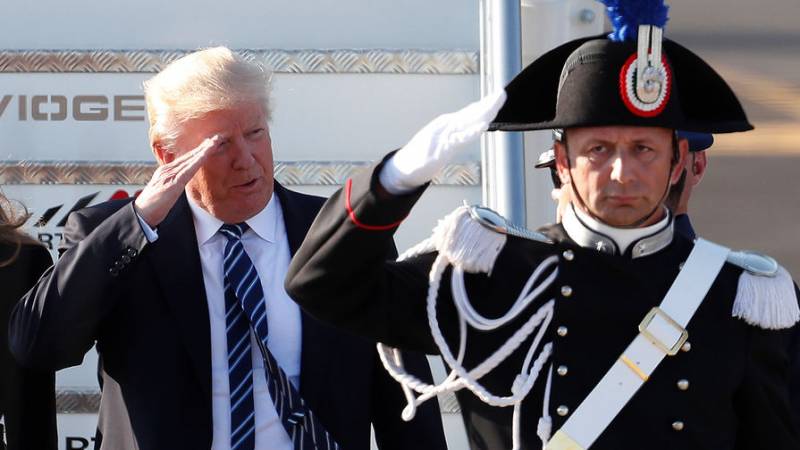Trump’s whirlwind tour of Europe, UK and Russia has left the world wondering whether America is keen to preserve the current liberal order. Trump’s description of Merkel as a captive of Russia and open condemnation of May’s brexit plans indicates more than a polite disagreement at the heart of the transatlantic alliance. To make matters worse, Trump proceeded to call the EU a foe ahead of his extraordinarily cordial meeting with Putin in Helsinki. Despite the boisterous backlash at home and Trump’s clumsy attempts to conceal his admiration for Russia, his global view centered on America first speaks volumes about the type of world his administration would like to see.
In the past, labels like unipolar, default, determinant, hegemonic, and hyper were often used to describe American power in fashioning and safeguarding the liberal order. The term status quo power neatly encapsulated this phenomenon. Those powers dissatisfied with America’s world order—like Russia and China—were classified as revisionist powers. Today, America’s behaviour magnifies the traits of a revisionist power more than a status quo power.
While many fail to acknowledge America as a revisionist power, some admit that Trump is a revisionist president. But even this categorization is incorrect and misleading. After all, 60 million Americans extremely dissatisfied with the liberal order elected Trump to upend it, and hitherto he has not disappointed them. This newfound support provides the necessary impetus behind Trump’s seemingly haphazard revisionist rhetoric ranging from trade to climate change.
Despite all the volte-face fiascos and chaos associated with Trump’s presidency there appears to be an underlying strategy to support the administration’s America first mantra. Trump’s disdain for multilateral agreements is the first signal that America does not want to play by the rules of the liberal order and is not concerned about the ramifications. Instead, Trump is seeking to replace multilateral agreements with bilateral ones. On his recent trip to Europe, he emphasized in an interview with The Sun newspaper that America would only enter into a trade alliance with the UK if Prime Minister May opted for hard brexit—a clean break from the EU.
Apart from trade, Trump’s administration is openly coveting the far right across the European continent. The main aim is to forge and encourage ties with European nationalists in order to dismember the EU. In Trump’s view, a collection of European nation states vying for supremacy is far better than the EU and this will assist America in striking bilateral deals with a variety of European countries.
For decades, the transatlantic alliance has served as the bedrock of the liberal order, which America has presided over. However, the Trump administration is looking to jettison Europe and establish new alliances with European partners and erstwhile enemy states like Russia. This brazen attempt to ditch old alliances has several European leaders worried. Germany’s foreign minister has recently stated that Europe can no longer fully rely on America. Elsewhere in Eastern Europe, countries close to Russia’s border worry about the permanence of American security. Trump’s persistent flip-flops over NATO and his inability to account Putin over Russia’s annexation of Crimea and forays into Ukraine accentuate such anxieties.
Trump’s treatment of revisionist states is also interesting. Regarding Russia, it is increasingly obvious that Trump seeks to rekindle the cold war détente that Kissinger had established. Putin and his courtier of advisors eagerly await to extend Russia’s cooperation with the US in Syria to other theatres of war and spheres of influence. As for China, Trump’s approach has been to pick a trade war with China and at the same time solicit Beijing’s cooperation over the settlement of the North Korea’s nuclear ambition.
There is little doubt that the recalibration of major power alliances under Trump has disrupted the liberal order and has placed the international system under permanent strain. Dealing with this disruption is problematic for many nations as most are unable to fathom the risks and opportunities in this transitionary period. Yet there are countries that are sitting on pivotal points on the change curve but are unable to seize the opportunity.
The Islamic world consists of fifty-five odd countries, traverses from East to West, occupies the most important geographical locations and is blessed with the abundance of resources and wealth. But in the fluidity of interruption to the international system caused by Trump, 1.6 billion Muslims remain hostages of narrow-sighted leaders who prefer to remain surrogates of major powers than to act as agents of change.
It can be argued that Trump is using the resources of the Muslim world to orchestrate his disruption of the liberal order. America’s withdrawal from the Iranian nuclear accords and Trump’s pressure on Saudi Arabia to pump more oil to make up for lost Iranian crude underscores the ease at which America is able to exploit Muslim resources to pressurize major powers into changing their behaviour. The EU and Russia are powerless to help Iran, while curbs on Iran to sell oil have spiked oil prices, which hurts China’s oil hungry economy.
For far too long the Muslim world has been a vassal of foreign powers. It is more than capable of uniting into a single entity and exerting its full independence. Such a state would disrupt the disruptor and eclipse the transitionary world order. Is there anyone brave enough to grab this opportunity, overturn the existing world order and make the Islamic world the status quo power on earth?
﴿قُلْ يَا قَوْمِ اعْمَلُوا عَلَى مَكَانَتِكُمْ إِنِّي عَامِلٌ فَسَوْفَ تَعْلَمُونَ مَنْ تَكُونُ لَهُ عَاقِبَةُ الدَّارِ إِنَّهُ لَا يُفْلِحُ الظَّالِمُونَ﴾
“Say, “O my people, work according to your position; [for] indeed, I am working. And you are going to know who will have succession in the home. Indeed, the wrongdoers will not succeed.”
[Al-An’am:135]
Written for the Central Media Office of Hizb ut Tahrir by
Abdul Majeed Bhatti

